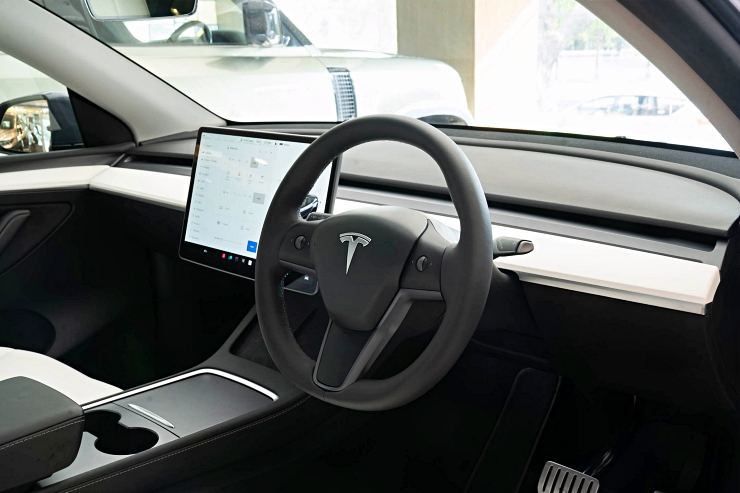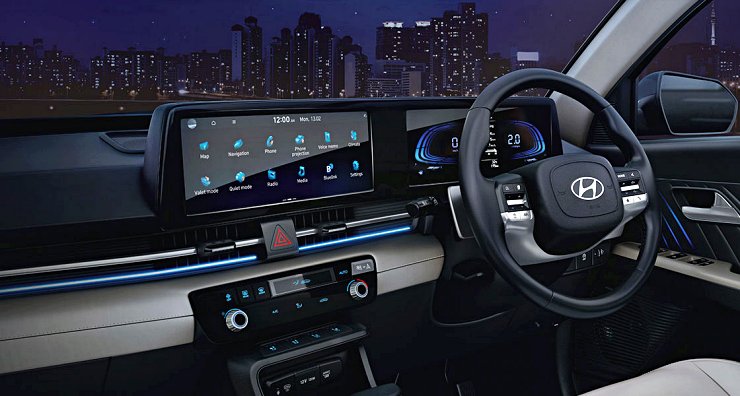Euro NCAP: Bring Back Physical Buttons In Cars For Higher Safety
The European New Car Assessment Programme (Euro NCAP), a leading organization in vehicle safety assessment, is proposing new guidelines that could significantly impact the design of car interiors starting in 2026. The initiative focuses on addressing the potential safety risks associated with the growing trend of replacing physical buttons with touchscreen controls in modern vehicles.
Euro NCAP’s Director of Strategic Development, Matthew Avery, emphasizes the organization’s concern that the reliance on touchscreens for critical functions like turn signals, windshield wipers, and hazard lights can lead to driver distraction, increasing the risk of accidents. The proposed guidelines encourage car manufacturers to reintroduce physical controls for essential functions, minimizing the need for drivers to take their eyes off the road while operating the vehicle.
While not advocating for a complete return to an outdated, button-laden dashboard, Euro NCAP emphasizes the importance of tactile controls for critical features like turn signals, emergency warnings, and communication systems.

This initiative puts companies like Tesla under closer scrutiny, known for their minimalist interiors and heavy reliance on touchscreen interfaces. Tesla’s recent decision to replace traditional turn signal stalks with haptic buttons on the steering wheel could be evaluated under Euro NCAP’s evolving criteria.
It’s important to understand that Euro NCAP doesn’t have direct regulatory power over car manufacturers. However, their widely respected safety ratings hold significant influence in the industry. Achieving a five-star rating from Euro NCAP is a major selling point for automakers, making their guidelines highly impactful. This influence extends beyond Europe, as car manufacturers often strive for.

While Euro NCAP’s objective is clearly to enhance road safety, the proposal raises questions about the delicate balance between technological advancement and driver distraction. Critics argue that touchscreen interfaces, while offering a sleek aesthetic and potentially user-friendly experience, might compromise safety by requiring drivers to interact with digital displays while behind the wheel.
Studies have shown that interacting with touchscreens can take a driver’s eyes off the road for longer periods compared to using physical controls, potentially leading to delayed reaction times and increased risk of accidents.
Zero Star Rating For Mahindra Scorpio-N Unfair: Australian Car Expert
Proponents of touchscreens argue that the technology can offer a more intuitive and customizable experience, but Euro NCAP’s stance highlights the need to prioritize safety without sacrificing essential functionality.
With Euro NCAP’s proposed guidelines yet to be implemented, it remains to be seen how car manufacturers will respond to this call for a return to physical controls. However, considering the ever-growing focus on safety in the automotive industry, it’s highly likely that many companies will adapt their design strategies to meet the evolving standards set by Euro NCAP.
The post Euro NCAP: Bring Back Physical Buttons In Cars For Higher Safety first appeared on Cartoq.
The European New Car Assessment Programme (Euro NCAP), a leading organization in vehicle safety assessment, is proposing new guidelines that could significantly impact the design of car interiors starting in 2026. The initiative focuses on addressing the potential safety risks associated with the growing trend of replacing physical buttons with touchscreen controls in modern vehicles.

Euro NCAP’s Director of Strategic Development, Matthew Avery, emphasizes the organization’s concern that the reliance on touchscreens for critical functions like turn signals, windshield wipers, and hazard lights can lead to driver distraction, increasing the risk of accidents. The proposed guidelines encourage car manufacturers to reintroduce physical controls for essential functions, minimizing the need for drivers to take their eyes off the road while operating the vehicle.
While not advocating for a complete return to an outdated, button-laden dashboard, Euro NCAP emphasizes the importance of tactile controls for critical features like turn signals, emergency warnings, and communication systems.

This initiative puts companies like Tesla under closer scrutiny, known for their minimalist interiors and heavy reliance on touchscreen interfaces. Tesla’s recent decision to replace traditional turn signal stalks with haptic buttons on the steering wheel could be evaluated under Euro NCAP’s evolving criteria.
It’s important to understand that Euro NCAP doesn’t have direct regulatory power over car manufacturers. However, their widely respected safety ratings hold significant influence in the industry. Achieving a five-star rating from Euro NCAP is a major selling point for automakers, making their guidelines highly impactful. This influence extends beyond Europe, as car manufacturers often strive for.

While Euro NCAP’s objective is clearly to enhance road safety, the proposal raises questions about the delicate balance between technological advancement and driver distraction. Critics argue that touchscreen interfaces, while offering a sleek aesthetic and potentially user-friendly experience, might compromise safety by requiring drivers to interact with digital displays while behind the wheel.
Studies have shown that interacting with touchscreens can take a driver’s eyes off the road for longer periods compared to using physical controls, potentially leading to delayed reaction times and increased risk of accidents.
Zero Star Rating For Mahindra Scorpio-N Unfair: Australian Car Expert
Proponents of touchscreens argue that the technology can offer a more intuitive and customizable experience, but Euro NCAP’s stance highlights the need to prioritize safety without sacrificing essential functionality.
With Euro NCAP’s proposed guidelines yet to be implemented, it remains to be seen how car manufacturers will respond to this call for a return to physical controls. However, considering the ever-growing focus on safety in the automotive industry, it’s highly likely that many companies will adapt their design strategies to meet the evolving standards set by Euro NCAP.
The post Euro NCAP: Bring Back Physical Buttons In Cars For Higher Safety first appeared on Cartoq.
